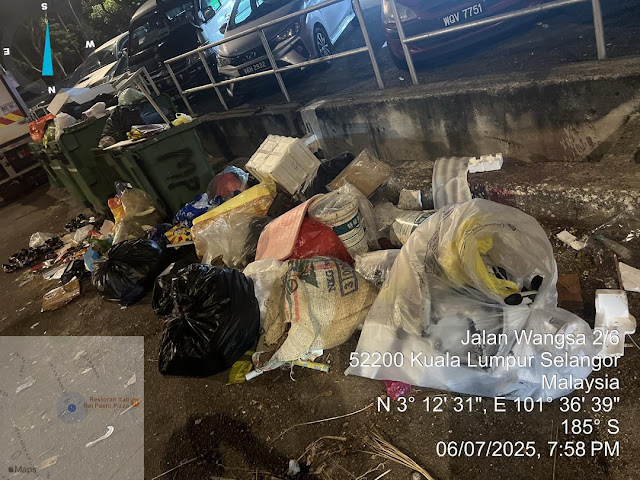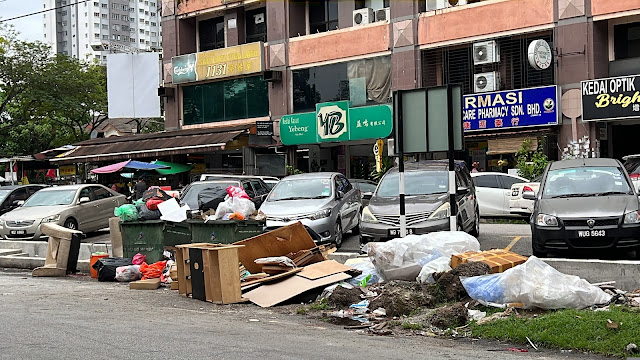IT has been an endless battle for many of us who want to ensure that the township remains clean, especially when we have visitors to entertain.
All along, it has been all talk and no solution to the persistent problem of illegal dumps in our area—so much so that I feel compelled to criticise Pakatan Harapan in Selangor for failing to address the issue. Money is wasted on banners such as this, and if I had not raised concerns about local councillors using public funds to print their own festive banners, this practice might have continued under the watchful eyes of the elected representatives.
The problem of illegal dump persists till today in most areas under MPS (see the first picture up this blog). No difference from the past few years.
It’s clear that the councillor’w weekday campaign — which is more ‘syiok sendiri’ — hasn't made a dent in the illegal dumping issue especially when the problem is so widespread across the municipality.
That said, there’s finally a shift in tone from the top. Housing and Local Government Minister Nga Kor Ming has introduced tougher penalties for litterbugs, including community service of up to 12 hours and fines of up to RM2,000. The idea is to make the punishment not just financial, but also socially corrective—offenders may be required to clean public spaces in uniform, which could serve as a deterrent.
As for the MPS (Selayang Municipal Council), unless enforcement is active, we will not see any change.
Cleaning up can be done by the solid waste company KDEB; however, many residents feel that unless surprise inspections and consistent monitoring are carried out—especially in known hotspots—the problem will persist.
Each time a complaint is lodged, the local council is quick to shift the blame onto illegal immigrants, local residents, or KDEB for failing to clean up the dumps.
It is high time for the council president and his officials to be held accountable when they fail to go down to the ground to resolve the issue of illegal dumping. They cannot expect people’s attitude to change until they themselves take full responsibility.
Penang has done it successfully. Today, Penang is many times cleaner than Selangor - and definitely the areas under the care of MPS. The island is definitely bigger than the Selayang municipality.
Browsing through this entire blog clearly shows that the MPS has consistently failed to carry out its responsibilities over the years—I have personally monitored the local council for the past 30 years since they changed name from Gombak District Council to what it is today.
The officials seem to have ample time to create issues and revisit them two or three times before finding a solution (I will elaborate in another post), yet when it comes to complaints about illegal dumps, it is invariably KDEB that bears the brunt.
Companies such as KDEB can only clear illegal dumps on their scheduled dates. However, when a complaint is lodged, they often oblige and carry out the cleanup even if it falls outside the planned schedule. The root of the problem, however, remains unresolved due to the persistent lack of supervision by the local council and its councillors.


From what I have observed, other councils appear to handle their illegal dumping issues more effectively—particularly in Petaling Jaya and Kuala Lumpur.
For instance, at one location I had reported along Jalan Tembaga SD5/2 in Sri Damansara, where illegal dumping had begun to occur, the mayor promptly dispatched his officers to investigate. While I am not aware of what transpired behind the scenes, the illegal dump was eventually cleared, and since then, there has been no recurrence.
Similarly, at a corner just below the NKVE in Kampung Segambut Dalam, what was once a hotspot for illegal rubbish has significantly improved. After the site was cleaned, SWCorp installed a warning sign, and to this day, each time I pass by, the area is no longer an eyesore.
The Minister’s recent actions are commendable and may serve as an effective deterrent to further illegal dumping. Otherwise, it remains a never-ending issue, particularly in the state of Selangor—which has regrettably become synonymous with illegal dumping.
In areas under MPS, for example, the problem is rampant, yet no meaningful steps have been taken to ensure that council staff are consistently on the ground maintaining cleanliness. Remarkably, even after 30 years since attaining municipal status, not a single household rubbish bin has been provided.














Comments
Post a Comment